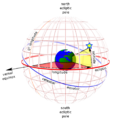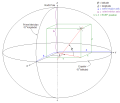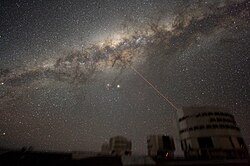The galactic coordinate system is a celestial coordinate system in spherical coordinates, with the Sun as its center, the primary direction aligned with...
15 KB (1,383 words) - 10:24, 1 August 2024
The equatorial coordinate system is a celestial coordinate system widely used to specify the positions of celestial objects. It may be implemented in spherical...
17 KB (1,657 words) - 07:37, 20 March 2025
The supergalactic coordinate system is a reference frame for the supercluster of galaxies that contains the Milky Way galaxy, referenced to a local relatively...
7 KB (927 words) - 03:24, 17 July 2024
delineation of the galactic quadrants is based upon the galactic coordinate system, which places the Sun as the pole of the mapping system. The Sun is used...
11 KB (911 words) - 12:34, 31 May 2024
still the center of the coordinate system, and the zero point is defined as the direction towards the Galactic Center. Galactic latitude resembles the...
29 KB (3,971 words) - 18:25, 17 April 2025
HIP 27180 appears closest to this point. In terms of the galactic coordinate system, the Galactic Center (in Sagittarius) corresponds to a longitude of 0°...
3 KB (181 words) - 07:50, 21 July 2024
ecliptic coordinate system uses the ecliptic. The galactic coordinate system uses the Milky Way's galactic equator. Plane of reference Rogers, Lucy (2008)...
2 KB (178 words) - 15:13, 9 January 2025
In mathematics, a spherical coordinate system specifies a given point in three-dimensional space by using a distance and two angles as its three coordinates...
43 KB (6,355 words) - 20:55, 14 April 2025
122.932°. The Galactic Center is located at position angle 31.72° (B1950) or 31.40° (J2000) east of north. Galactic coordinate system LHS 1815b example...
3 KB (316 words) - 12:14, 7 June 2025
Interacting galaxy (redirect from Galactic collision)
speeds and suffering frequent encounters with other systems of the cluster due to the high galactic density. According to computer simulations, the interactions...
13 KB (1,149 words) - 20:51, 25 May 2025
Sagittarius A as the true zero coordinate point for the system of galactic latitude and longitude. In the equatorial coordinate system the location is: RA 17h...
50 KB (5,109 words) - 19:52, 28 May 2025
corona – Hot, ionised, gaseous component of a galactic halo Galactic coordinate system – Celestial coordinate system in spherical coordinates, with the Sun as...
8 KB (1,165 words) - 00:43, 25 May 2025
In astronomy, the ecliptic coordinate system is a celestial coordinate system commonly used for representing the apparent positions, orbits, and pole orientations...
14 KB (1,331 words) - 02:25, 16 December 2024
galactic coronas are formed and maintained. Galaxy formation and evolution – Subfield of cosmology Galactic coordinate system – Celestial coordinate system...
4 KB (539 words) - 03:30, 2 April 2025
The horizontal coordinate system is a celestial coordinate system that uses the observer's local horizon as the fundamental plane to define two angles...
9 KB (944 words) - 04:39, 7 January 2025
Spiral galaxy (redirect from Galactic spheroid)
very bright nuclei Galactic coordinate system – Celestial coordinate system in spherical coordinates, with the Sun as its center Galactic corona – Hot, ionised...
34 KB (4,004 words) - 03:33, 28 April 2025
Way's galactic equator. These 3D celestial coordinate systems add actual distance as the Z axis to the equatorial, ecliptic, and galactic coordinate systems...
9 KB (912 words) - 16:39, 14 December 2024
List of Star Trek regions of space (redirect from Galactic Barrier (Star Trek))
with Star Trek: The Next Generation, the term refers to a galactic coordinate system. Galactic quadrants within Star Trek are based around a meridian that...
32 KB (4,091 words) - 01:01, 2 February 2025
galactic form Spiral galaxy – Class of galaxy that has spiral structures extending from their cores Galactic coordinate system – Celestial coordinate...
17 KB (1,930 words) - 00:40, 24 April 2025
diffuse to the viewer. The Galactic Ridge has a width of 5° latitude (b) and ±40° longitude (l) in the Galactic coordinate system. The first instrument that...
7 KB (944 words) - 14:25, 15 February 2025
GCS may refer to: Galactic coordinate system Geographic coordinate system Game creation system Gauss Centre for Supercomputing, in Germany Google Cloud...
2 KB (239 words) - 21:41, 2 February 2024
Galaxy formation and evolution (redirect from Galactic formation)
coordinate system in spherical coordinates, with the Sun as its center Galactic corona – Hot, ionised, gaseous component of a galactic halo Galactic halo –...
46 KB (5,624 words) - 04:13, 13 May 2025
Milky Way (section Galactic quadrants)
delineation of the galactic quadrants is based upon the galactic coordinate system, which places the Sun as the origin of the mapping system. Quadrants are...
219 KB (22,003 words) - 03:00, 2 June 2025
collisions Class L, a stellar classification Galactic longitude (l), in the galactic coordinate system l, abbreviation for liquid Avogadro constant,...
6 KB (801 words) - 12:21, 28 May 2025
to: Space velocity (astronomy), the velocity of a star in the galactic coordinate system Space velocity (chemistry), the relation between volumetric flow...
263 bytes (66 words) - 19:06, 3 May 2021
have a common origin. In the galactic coordinate system, the [U, V, W] components of the space velocity for this system are equal to [−70.2, −47.4, +16...
24 KB (2,162 words) - 00:26, 3 June 2025
Barnard list of dark nebulae (abbreviation B) Latitude (b) in the galactic coordinate system Haplogroup B (mtDNA), a human mitochondrial DNA (mtDNA) haplogroup...
5 KB (676 words) - 12:06, 28 April 2025
planets. He reported it as the Great Perseus-Andromeda stratum of Extra-Galactic Nebulae. Earlier still, parts of this clustering had been reported by Walter...
3 KB (307 words) - 08:59, 31 May 2025
System in terms of observer-neutral celestial coordinate systems—systems that are neither geocentric nor heliocentric—such as the galactic coordinate...
7 KB (571 words) - 10:02, 26 March 2025
Vega (category Hypothetical planetary systems)
components in the Galactic coordinate system are: U = −10.7±3.5, V = −8.0±2.4, W = −9.7±3.0 km/s. UVW is a Cartesian coordinate system, so the Euclidean...
98 KB (10,326 words) - 22:53, 27 May 2025



















